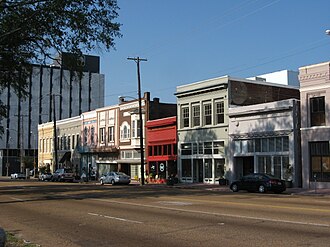
Mississippi is known as the “Magnolia State” and the "Hospitality State". The name comes from the abundance of magnolia trees that grow throughout the state. The magnolia is also the official state flower and tree. The magnolia blossom can be found on trees throughout the bayous of Mississippi.[1] As for the nickname Hospitality State, it reflects the welcoming nature of Mississippi’s residents.[2]
Mississippi is the 32nd largest state by area in the U.S., covering 48,432 square miles.[3] As of 2023, the population of Mississippi was approximately 2,919,103.[4] Jackson is both the state’s capital and largest city.[5]
Mississippi’s economy ranks 37th in size among states and Washington, DC.[6] Mississippi’s gross state product (GSP) in 2023 reached $105.1 billion.[4] The largest sectors of the state’s economy are manufacturing and services, primarily government (federal, state, and local), retail and wholesale trade, real estate, and health and social services Agriculture, forestry, and fishing also play significant roles, with cotton, livestock, catfish from aquaculture, poultry, and various crops such as soybeans and sweet potatoes being important products.
Research your ancestors on MyHeritage
History of MississippiHistory of Mississippi
The first major European expedition into the territory that became Mississippi was Spanish, led by Hernando de Soto, which passed through in the early 1540s. De Soto’s discovery of the Mississippi in 1541 marked the beginning of European exploration in the region.[7] Mississippi was the second southern state to declare its secession from the United States, doing so on January 9, 1861. It joined with six other southern states to form the Confederacy on February 4, 1861. Mississippi’s location along the lengthy Mississippi River made it strategically important to both the Union and the Confederacy; dozens of battles were fought in the state as armies repeatedly clashed near key towns and transportation nodes.[8] Mississippi’s social and economic histories in early statehood were driven by cotton and slave labor. Cotton was a labor-intensive business, and the large number of workers required to grow and harvest cotton came from slave labor until the end of the American Civil War.[9]
After accommodating themselves to the major social changes of the mid-20th century, Mississippians could at last turn their attention and energy to the development of the state’s human and natural resources.[10] Although there has been significant improvement in employment and compensation in Mississippi since the mid-20th century, growth at the regional and national levels has been proportionately greater. Consequently, in the early 21st century, the state remained disadvantaged economically, with a per capita gross product that was among the lowest in the country.[11]
Demographics of MississippiDemographics of Mississippi
The demographic distribution of Mississippi population is as follows:[12]
- White: 57.36%
- Black or African American: 37.53%
- Two or more races: 2.36%
- Other race: 1.28%
- Asian: 0.98%
- Native American: 0.45%
- Native Hawaiian or Pacific Islander: 0.04%
Most common surnames in MississippiMost common surnames in Mississippi
Researching family history in MississippiResearching family history in Mississippi
The National Archives at Atlanta has records from federal agencies and many other federal records for Mississippi, Alabama, Florida, Georgia, Kentucky, North Carolina, South Carolina, and Tennessee. The Mississippi Department of Archives and History has original records from all the Mississippi counties including newspapers, genealogies, and county histories. There are also local county and university resources.
Mississippi County ListMississippi County List
Mississippi has 82 counties.
| Adams | Alcorn | Amite | Attala |
| Benton | Bolivar | Calhoun | Carroll |
| Chickasaw | Choctaw | Claiborne | Clarke |
| Clay | Coahoma | Copiah | Covington |
| DeSoto | Forrest | Franklin | George |
| Greene | Grenada | Hancock | Harrison |
| Hinds | Holmes | Humphreys | Issaquena |
| Itawamba | Jackson | Jasper | Jefferson |
| Jefferson Davis | Jones | Kemper | Lafayette |
| Lamar | Lauderdale | Lawrence | Leake |
| Lee | Leflore | Lincoln | Lowndes |
| Madison | Mairon | Marshall | Monroe |
| Montgomery | Neshoba | Newton | Noxubee |
| Oktibbeha | Panola | Pearl River | Perry |
| Pike | Pontotoc | Prentiss | Quitman |
| Rankin | Scott | Sharkey | Simpson |
| Smith | Stone | Sunflower | Tallahatchie |
| Tate | Tippah | Tishomingo | Tunica |
| Union | Walthall | Warren | Washington |
| Wayne | Webster | Wilkinsonw | Winston |
| Yalobusha | Yazoo |
See alsoSee also
Explore more about MississippiExplore more about Mississippi
MyHeritage.com has 13 collections of records from Mississippi, including Mississippi Voter Registrations, Land Patents - Mississippi, and many others.
References
- ↑ Why Is Mississippi Called the Magnolia State? (with pictures)
- ↑ 11 Things That Prove Mississippi Truly Is The Hospitality State
- ↑ Mississippi
- ↑ 4.0 4.1 IBISWorld - Industry Market Research, Reports, and Statistics
- ↑ Jackson, Mississippi
- ↑ Economy of Mississippi Statistics and Data Trends: GDP ranking, unemployment rate, and economic growth | USAFacts
- ↑ De Soto's discovery of the Mississippi, 1541 | Gilder Lehrman Institute of American History
- ↑ Civil War
- ↑ Cotton in a Global Economy: Mississippi (1800-1860)
- ↑ Mississippi - WWI, Civil Rights, Movement | Britannica
- ↑ Mississippi - Agriculture, Manufacturing, Tourism | Britannica
- ↑ Mississippi Population 2024 (Demographics, Maps, Graphs)

